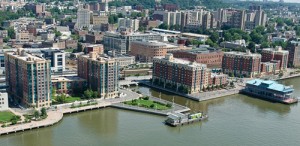New partner, new plans in Yonkers

A waterfront redeveloper who succeeded in building where others have foundered in the economic downturn has brought a new equity partner into Yonkers and plans to build some more.
Collins Enterprises L.L.C., based in Stamford, Conn., has teamed with a majority partner, Berkshire Property Advisors in Manhattan, at Hudson Park, the 560-unit luxury rental development beside the Yonkers City Pier. Collins principals said the development, which also includes 15,500 square feet of retail, restaurant and professional office space, is 95 percent leased since its second phase, the $104 million, 294-unit Hudson Park North, was completed in 2008.
The $147 million recapitalization deal includes a $63 million loan by Wells Fargo Bank backed by Freddie Mac, the Federal Home Loan Mortgage Corp. Collins Enterprises remains the partnership”™s managing member and will continue to operate the property.
A multifamily real estate investor and manager since 1969, Berkshire Property Advisors has approximately $4 billion of assets under management. It operates in 30 major markets nationwide.
“They were very eager to enter the New York metropolitan market,” said Dwight T. Collins, co-founding principal at Collins Enterprises. The companies began talking about two years ago, he said. “They were very, very interested in this property. They worked very hard on this”¦It wasn”™t an easy deal to close.” The Hudson park deal is Berkshire”™s first acquisition in the New York market.
Berkshire”™s equity stake allows Collins and his brother, Arthur, to proceed with their plans for the third phase of Hudson Park, an approximately 20-story residential tower with 180 to 200 apartments that will rise on a 10,000-square-foot footprint at the north end of the Hudson Park site.
Collins said they hope to start construction in early 2013. The project is expected to be built in 14 to 16 months.
He said the developer is updating feasibility studies “and getting a sense of financing with this. Financing is really tough for a project like this.”
Still, building multifamily rental housing “is the only way” to obtain financing in the current market, said Arthur Collins. “The only really available capital in the marketplace is really in multifamily rental properties well-located next to the train station. It”™s hard to get other things financed today.”
Dwight Collins said 70 percent of Hudson Park tenants commute to midtown Manhattan.
On the Yonkers waterfront, they pay monthly rents that range from $220 to $240 per square foot, with one-bedroom apartments starting at $1,800 and two-bedroom apartments topping out at $3,000. Those rents are well below typical rents in Manhattan. And Hudson Park offers striking views across the river of the Palisades.
In Yonkers, “There”™s a demand” for rental housing, said Arthur Collins. “There”™s a housing shortage in New York City itself.”
A decade ago, with construction of the $62 million, 220-unit Hudson Park South, Collins Enterprises was the vanguard of a redevelopment effort in downtown Yonkers in which City Hall partnered with private developers to launch an economic renaissance and attract new residents and visitors to a city once driven by its manufacturing industries. But redevelopment plans stalled or ended in developers”™ bankruptcies and loan defaults in the recession, credit freeze and continued economic downturn. The city”™s master downtown developer, Struever Fidelco Cappelli L.L.C., has shown no progress on its downtown retail and entertainment complex, River Park Center, and Palisades Point, a luxury residential development near Hudson Park on the waterfront.
The city”™s redevelopment campaign “definitely took a step back,” said Dwight Collins. “We all took a step back in Yonkers.”
Collins said the city”™s recent project to uncover the Saw Mill River and create a new public park and riverwalk at downtown Larkin Plaza “is a major statement of how Yonkers has been able to keep going despite very difficult economic circumstances.”
“It will come back gradually,” Collins said. “It will be slow going.”